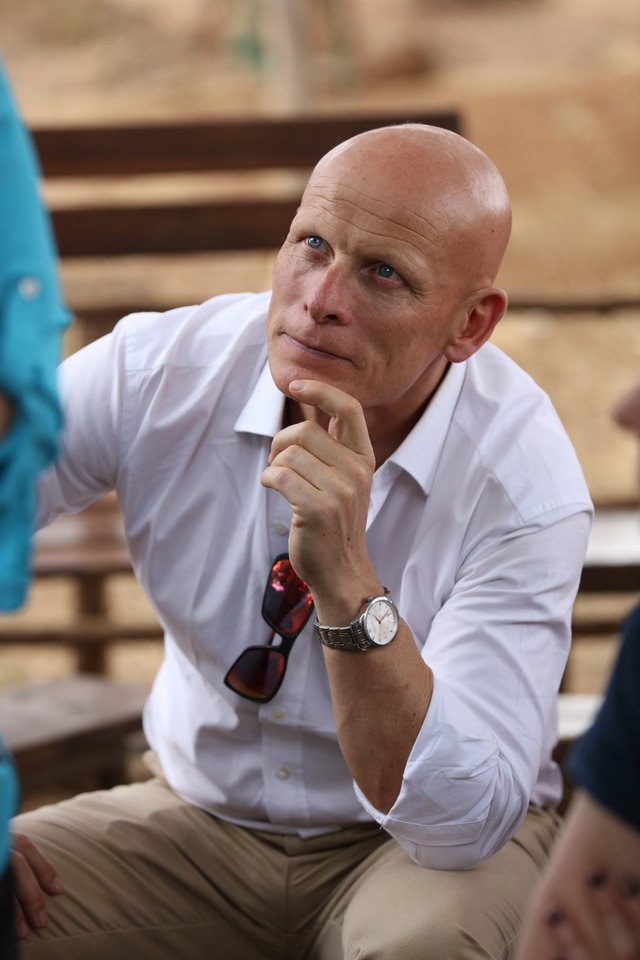‘Social what?’ I said, or words to that effect. ‘Never heard of it.’
‘I said “social intrapreneur”. We think you’re one of them, Gib,’ she replied.
Now I’ve been called many things in my time, but this was a first. Yet while the label is not that important, I discovered I did buy into the concept, into the notion that when a business professional is seeking more purpose in their career, rather than changing job or company, you actually try to change the company you’re in. As I’ve already mentioned, today’s corporations are absolutely massive, gigantic behemoths. Believe it or not, if Apple were a country, it would just about knock Switzerland out of the G20. So if you use the analogue of a supertanker, changing course by even one degree can be slow and use a lot of energy, but results in a massive impact downstream. Yes, it may well have been easier to come back from Macedonia in 2001 and subsequently leave Accenture to create a consulting social enterprise. However, even the prospect of getting that one-degree shift in direction of the 400,000 person, $70 billion market cap Accenture supertanker, was worth staying for. I’m glad I did and I’m glad others did, too, within their own organisations.
Take, for example, the mobile phone industry. Near the beginning of ADP’s life, I met Nick Hughes, a junior manager in Vodafone’s Marketing department. Nick was a smart guy and he noticed that Vodafone’s customers in Kenya were exchanging mobile phone airtime as a form of alternative currency, largely due to a lack of banking infrastructure. Nick is widely credited with sparking a mobile banking revolution in Africa, by coming up with the idea to create M-PESA in Kenya. Now over 80 per cent of the Kenyan economy flows through mobile money.
I somewhat serendipitously encountered a couple of other impressive people in these early days who, along with others, would go on to define the early social intrapreneurship movement. I met Roberto Bocca in London, when he was working for the oil giant, BP. Roberto had managed to create a startup business in India to provide ‘clean’ cooking stoves that would encourage people to stop cooking on open fires. I learnt that so called ‘indoor air pollution’ is the fourth-biggest killer worldwide, through respiratory diseases. Roberto’s business grew to over 500,000 customers in India alone – impressive.
It was around the same time that a mutual friend introduced me to Jo da Silva, who was an engineer within Arup, a company specialising in planning and technical design, but had worked extensively as a volunteer in the post-disaster emergency relief sector. Jo quizzed me on ADP’s business model as she thought something similar could be done within Arup. She would go on to set up Arup International Development, a not-for-profit arm of Arup, focused on bringing their technical expertise in engineering design and construction to the humanitarian and development sector. Pretty cool.
Nick, Roberto and Jo all had the option to quit their jobs and go out on their own – but, for whatever reason, they stayed put and sought to drive change from within the system rather than from the outside. That’s not easy, as I knew only too well.
Maggie and I remained good friends since that first connection in 2007 and, along with a few other ‘mavericks’, she co-founded the League of Intrapreneurs. Its aim is to develop a movement of entrepreneurial changemakers willing to hack the system from within. Many will reside within these corporate supertankers, but there are also social intrapreneurs within NGOs and government agencies. The League of Intrapreneurs is trying to connect these people from within and across the sectors to try to drive change bottom up, inside out. No, you don’t have to wait for a time when you might become CEO to drive change within your organisation. After all, for most people, that time will never come. That said, there’s a fine line between being a ‘changemaker’ and being branded a ‘troublemaker’, and intrapreneurs are no doubt a bit of both. That makes them something of an endangered species, certainly within the corporate world. It’s almost as if a set of antibodies are unleashed by the parent organisation to try to attack anything that doesn’t look like it’s maximising short-term profit in the next quarter. I’ve often referred to this as the ‘ corporate immune system’– an invisible force made up of a combination of culture, risk management policies and inertia that can kill social innovation without even leaving any fingerprints.
The Intrapreneur: Confessions of a Corporate Insurgent is due out on 10th April and is available for pre-order on Amazon here

